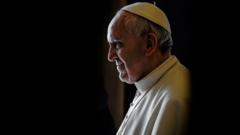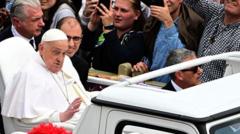Pope Francis, who took the papal throne in 2013, redefined the Catholic Church by emphasizing social justice, humility, and global outreach, while he faced criticism over his handling of various controversies, including clerical abuse.
The Legacy of Pope Francis: A Transformative Path for the Catholic Church

The Legacy of Pope Francis: A Transformative Path for the Catholic Church
As the first Jesuit and Latin American Pope, Francis' tenure was marked by significant reforms, challenges, and a commitment to humility.
Pope Francis, born Jorge Mario Bergoglio in Buenos Aires in 1936, took office in 2013 as a breath of fresh air for the Catholic Church. He marked numerous historical milestones, being the first Latin American and Jesuit Pope, steering the Church towards a more inclusive and socially conscious path. Francis' election came at a time of transformative change when his predecessor, Benedict XVI, made waves by resigning, a rare event in over six centuries.
From the outset, Francis sought to reshape the perception and function of the papacy. He discarded traditions, opting for simplicity and accessibility by choosing to travel by bus with his fellow cardinals. He endeavored to champion a "poor Church for the poor," urging his 1.2 billion followers to embrace humility over luxury.
Despite the challenges he faced from conservative factions within the Vatican, Francis maintained a dual approach, appealing to both traditionalists with his adherence to core Church teachings and reformists by advocating for more progressive social justice initiatives. His views on issues such as abortion and LGBTQ+ rights showcased this balancing act, often straddling a fine line between modernity and tradition.
Francis’ papacy was profoundly marked by his leadership in addressing the Church’s handling of sexual abuse scandals, amplifying calls for accountability while navigating fierce backlash from segments of the Church. His involvement in global peacemaking efforts, notably in the Middle East and efforts to engage with the Eastern Orthodox Church, reinforced the Church's role in international diplomacy.
In response to the COVID-19 pandemic, he emphasized vaccination as a social duty and continued his engagements despite health obstacles, including recent hospitalizations for pneumonia. His legacy includes appointing over 140 cardinals from outside Europe, making the Church more globally representative.
Pope Francis cultivated a vision of a Church that moves beyond internal struggles to focus on serving the marginalized: "If I had to choose between a wounded Church that goes out on to the streets and a sick, withdrawn Church, I would choose the first." His distinctive approach to the papacy, characterized by humility and a dedication to social harmony, will leave an indelible mark on the future of the Catholic Church.






















